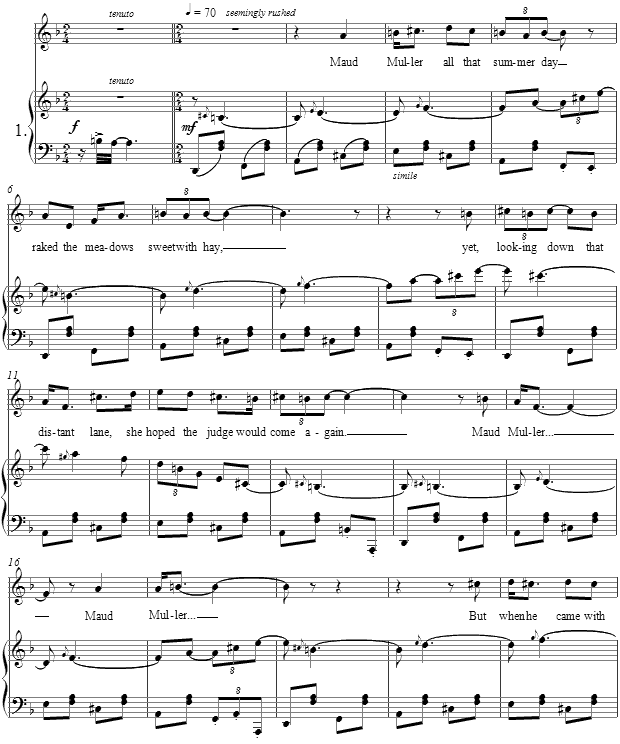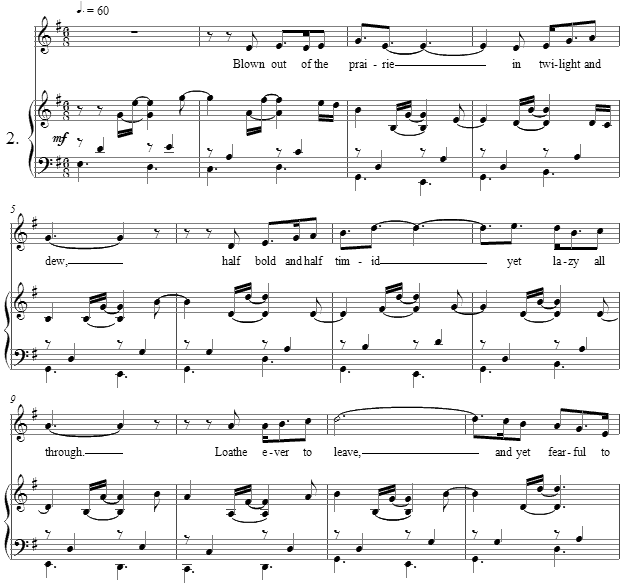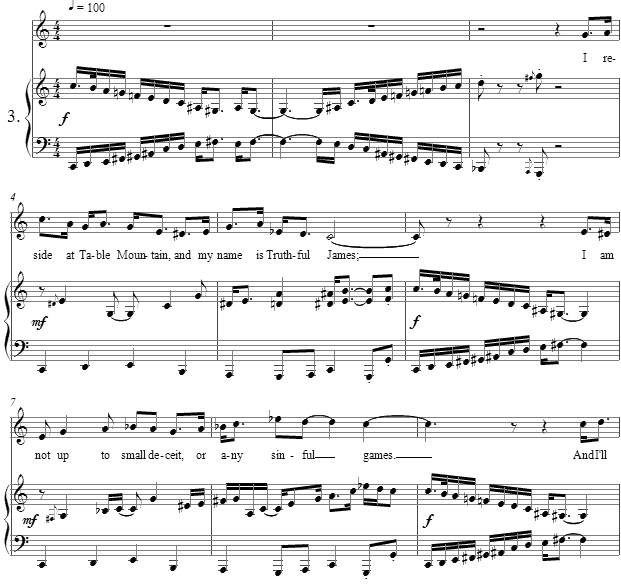Music and Texts of GARY BACHLUND
Vocal Music | Piano | Organ | Chamber Music | Orchestral | Articles and Commentary | Poems and Stories | Miscellany | FAQs
Harte Songs - (2005)
Bret Harte
for medium voice and piano
i. Mrs. Judge Jenkins [ 9 pages, circa 5' 55" ]
Maud Muller all that summer day
Raked the meadows sweet with hay;
Yet, looking down the distant lane,
She hoped the Judge would come again.
But when he came, with smile and bow,
Maud only blushed, and stammered, "Ha-ow?"
And spoke of her "pa," and wondered whether
He'd give consent they should wed together.
Old Muller burst into tears, and then
Begged that the Judge would lend him "ten";
For trade was dull, and wages low,
And the "craps", this year, were somewhat slow.
And ere the languid summer died,
Sweet Maud became the Judge's bride.
But on the day that they were mated,
Maud's brother Bob was intoxicated;
And Maud's relations, twelve in all,
Were very drunk in the Judge's hall.
And when the summer came again,
The young bride bore him babies twain;
And the Judge was blest, but thought it strange
That bearing children made such a change;
For Maud grew broad and red and stout,
And the waist that his arm once clasped about
Was more than he now could span: and he
Sighed as he pondered, ruefully,
How that which in Maud was native grace
In Mrs. Jenkins was out of place;
And thought of the twins, and wished that they
Looked less like the men who raked the hay
On Muller's farm, and dreamed with pain
Of the day he wandered down the lane.
And, looking down that dreary track,
He half regretted that he came back;
For, had he waited, he might have wed
Some maiden fair and thoroughbred;
For there be women fair as she,
Whose verbs and nouns do more agree.
Alas for maiden! alas for judge!
Add the sentimental, -- that's one-half "fudge";
For Maud soon thought the Judge a bore,
With all his learning and all his lore;
And the Judge would have bartered Maud's fair face
For more refinement and social grace.
If, of all words of tongue and pen,
The saddest are, "It might have been,"
More sad are these we daily see:
"It is, but hadn't ought to be."
ii. Coyote [ 6 pages, circa 3' 20]
Blown out of the prairie in twilight and dew,
Half bold and half timid, yet lazy all through;
Loath ever to leave, and yet fearful to stay,
He limps in the clearing, an outcast in gray.
A shade on the stubble, a ghost by the wall,
Now leaping, now limping, now risking a fall,
Lop-eared and large-jointed, but ever alway
A thoroughly vagabond outcast in gray.
Here, Carlo, old fellow,--he's one of your kind,--
Go, seek him, and bring him in out of the wind.
What! snarling, my Carlo! So even dogs may
Deny their own kin in the outcast in gray.
Well, take what you will--though it be on the sly,
Marauding or begging,--I shall not ask why,
But will call it a dole, just to help on his way
A four-footed friar in orders of gray!
iii. Plain Language from Truthful James [ 8 pages, circa 4' 25" ]
I reside at Table Mountain, and my name is Truthful James;
I am not up to small deceit, or any sinful games;
And I'll tell in simple language what I know about the row
That broke up our Society upon the Stanislow.
But first I would remark, that it is not a proper plan
For any scientific gent to whale his fellow-man,
And, if a member don't agree with his peculiar whim,
To lay for that same member for to "put a head" on him.
Now nothing could be finer or more beautiful to see
Than the first six months' proceedings of that same Society,
Till Brown of Calaveras brought a lot of fossil bones
That he found within a tunnel near the tenement of Jones.
Then Brown he read a paper, and he reconstructed there,
From those same bones, an animal that was extremely rare;
And Jones then asked the Chair for a suspension of the rules,
Till he could prove that those same bones was one of his lost mules.
Then Brown he smiled a bitter smile, and said he was at fault,
It seemed he had been trespassing on Jones's family vault;
He was a most sarcastic man, this quiet Mr. Brown,
And on several occasions he had cleaned out the town.
Now I hold it is not decent for a scientific gent
To say another is an ass, - at least, to all intent;
Nor should the individual who happens to be meant
Reply by heaving rocks at him, to any great extent.
Then Abner Dean of Angel's raised a point of order, when
A chunk of old red sandstone took him in the abdomen,
And he smiled a kind of sickly smile, and curled up on the floor,
And the subsequent proceedings interested him no more.
For, in less time than I write it, every member did engage
In a warfare with the remnants of the palaeozoic age;
And the way they heaved those fossils in their anger was a sin,
Till the skull of an old mammoth caved the head of Thompson in.
And this is all I have to say of these improper games,
For I live at Table Mountain, and my name is Truthful James;
And I've told in simple language what I knew about the row
That broke up our Society upon the Stanislow.
Total cycle [ 23 pages, circa 13' 40" ]
Bret Harte
American writer Bret Harte, born 1836, tried several occupations before he became a writer and a journalist, and his writing life was full of ups and downs. He became the founding editor of the Overland Monthly in 1868, some years after being run out of Eureka California for printing a factual report of a massacre of Indians.
In the early 1870s, Harte was at the top of his career. It's said he was the highest paid, most-read author of the day. Mark Twain is quoted as saying " . . though I am generally placed at the head of my breed of scribblers in this part of the country, the place properly belongs to Bret Harte." But his popularity became his undoing and he found himself unable to produce and compete with other writers of the day. In 1877 he became a commercial agent in Prussia, and later American Consul in Glasgow, Scotland. He died 25 years later in London.
While best known for his stories such as "The Luck of Roaring Camp" and "The Outcasts of Poker Flat," Harte also wrote numerous poems, including the wildly popular satire "The Heathen Chinee," which he called "the worst poem I ever wrote."
These songs for baritone are meant for a performer who is a storyteller as well as a singer, and each is a ballad in the sense of a vignette with perhaps a moral to be drawn from such a bit of storytelling. The set is titled "Harte Songs," a deliberate recollection of those song books and hymnals of that time and in the early twentieth century when gospel songs were often published as "Heart Songs."
In the first, a rather bitter judge has chosen Maud Muller to become Mrs. Judge Jenkins, and then, looking back, rues his decision and their subsequent life together. Harte teaches that "If, of all words of tongue and pen, the saddest are, it might have been, more sad are these we daily see: It is, but hadn't ought to be." There is dark humor in his retelling of this age-old dilemma represented in brittle harmonic and repetitive underpinning to the ballad. It is a dark spoof of John Greenleaf Whittier's earlier and very popular poem, "Maud Muller," in which the story of these characters is much less unsavory. One can read the two comparatively and enjoy Harte's humor all the more.

The second song is a classical reinterpretation of the American country and western ballad genre, sweetened by the range and sweet gentility of the accompaniment. A song about a coyote, told in stylish verse.

The last is a droll reporting of a brawl between hardy men over some bones from a "palaeozoic age." Harte's journalistic style is turned into rhymed verse, slightly distant and tongue definitely in cheek in describing the mayhem. Shall one believe Truthful James' retelling? The "Stanislow" is the Stanislaus River in the Sierra Nevada range of California, a favorite locale for a number of Harte's well known stories, the county in California is named after this river.

